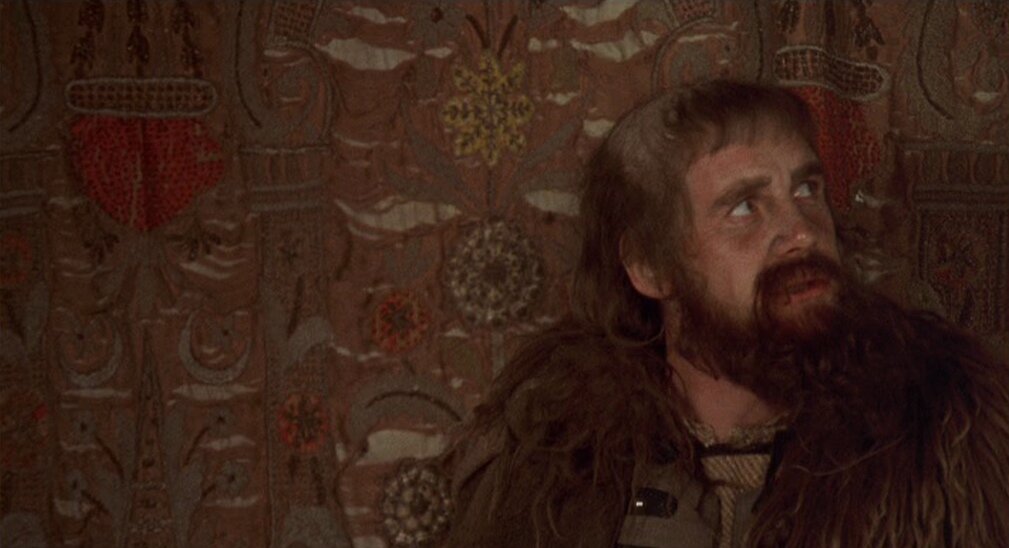Monty Python and the Holy Grail (dir. Terry Jones and Michael Palin, 1975)- Review
“It was indignity heaped on indignity," recalled Michael Palin of the Python ensemble’s first venture outside the sketch format. "I remember suddenly screaming and throwing myself into the air, down into the mud, rolling around, yelling, 'fucking fucking waste of time’” (Hot Dog Magazine, October 2000).
Despite the suffering of its cast and crew, and the stony reception from test audiences, Monty Python and the Holy Grail turned out to be the opposite of a waste of time. The film’s pillorying of Merry Olde Englande, and English pretentiousness, propelled it to cult status in the US, where it became the highest grossing British film of the year; the 2005 stage adaptation, Spamalot, proved a great “help with the pension fund”, in Terry Gilliam’s words, grossing millions on both sides of the Atlantic.
Assaulting viewers with “wild Mexican mariachi music” over credits evoking a “flashing acid trip from Jimi Hendrix’s tequila nightmares” (per the screenplay), Python’s take on the Grail legend swiftly announced itself as anything but a conventional statement of the British founding myth. Yet for all its surface buffoonery, nearly fifty years after its release the film has begun to affirm the very concept of ‘timeless British identity’ which it set out to mock. Holy Grail’s breathless juxtaposition of icons of cultural identity- Arthurian knights and Holy Hand Grenades, monstrous forest guardians and the suburban shrubbery- draws not only comic anachronism, but a sense of persistent British weirdness, from its jaunt across the centuries. Floating freely in the surreal Python continuum of pop culture-slash-world-history, both the jokes and the particularly English truths of the film feel just as effective half a century after their conception.
Holy Grail, like much of the Python oeuvre, made efforts to distance itself from what it portrays as a nonsensical torrent of cultural objects, strung together to form a shambolic national identity. The whole article is wrapped in a thick layer of irony and obfuscation, from the battle between a ‘rogue Swedish subtitler’ and the ‘filmmakers’ in the opening credits, to the ‘Very Famous Historian’ who seems to wander straight from the pages of Lucky Jim to comment on a battle scene. However, such coolly detached, postmodern posturing was underscored by a very un-cool and authentic motive — the film’s shoestring budget. Much of Holy Grail’s self-referentiality, and the ensuing existential jokes, derived not from pretentious academicism, but from budgetary constraints; the coconut-shell ‘horses’, improvised when only one real horse could be afforded, are perhaps the most iconic example, parodying the radio sound effect.
The spectre of academic pretentiousness — the tweed-clad documentarian — is far from the only jarringly topical portrayal in the film. Dennis the Marxist serf satirises the apparently unchanging quality of both the British lefties, and, dishearteningly, the flaws of the electoral system: “supreme executive power derives from a mandate from the masses, not from some farcical aquatic ceremony”. And, of course, the confounding presence of the French — “you don’t frighten us, English pig-dogs! Go and boil your bottoms, sons of a silly person. I blow my nose on you, so-called Arthur-king, you and all your silly English kannnnniggets” — remains relatable to middle-class dads across the Home Counties.
Monty Python and the Holy Grail teased out a persistent sense of homegrown, wilful eccentricity from its parodic portrayal of British lives ancient and modern, a sense which seems to have grown only more potent in intervening decades. This quality, which underpinned the film and its production, is perhaps best encapsulated in John Cleese’s recollection of shooting his scenes as Lancelot on Hampstead Heath: “The camera couldn't be seen and there was no explanation for why I was sprinting along a path with a sword and yet nobody took the blindest bit of notice. Which I thought was wonderfully English."
Áine Kennedy is a London-based writer and manager of the ScriptUp blog.






